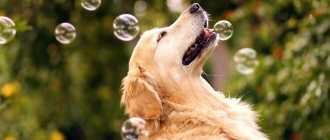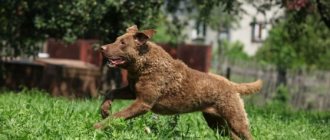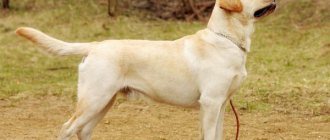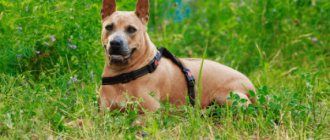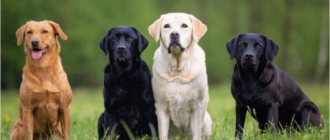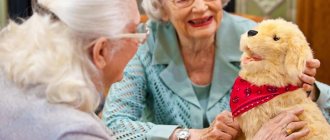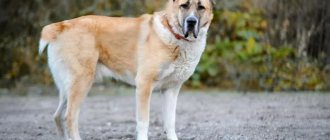The Golden Retriever is a breed of luxurious, noble dog known as Russian circus dogs. For a long time it was considered the descendants of Caucasian breeds. Today, retrievers are the true love of housewives, small children and advertising producers. In the West, retrievers are considered very popular large dogs for breeding in private homes. The Golden Retriever dog belongs to the conventional “sporting” breed, bred by the British at the end of the 19th century by crossing two breeds:
- Spaniel (tweed water);
- Yellow Retriever.
History of the breed
For many years, there was a legend that Golden Retrievers were descended from Russian Shepherds purchased from a circus. The breed was actually developed in Scotland, on the estate of Sir Dudley Majorbanks, later known as Lord Tweedmouth.
Tweedmouth bred animals of all kinds, trying to improve various breeds. Tweedmouth's breeding records from 1835 to 1890 show what he was aiming for: the dog had to be an excellent waterfowl hunter - with an excellent nose and more attentive to its owner than setters and spaniels. He also wanted the dog to be level-headed and loyal in a home with children. And he achieved it.
In 1911, the English Kennel Club officially recognized the Golden Retriever as a separate breed. At that time they were classified as either yellow or golden retrievers. In 1920, the breed's name was officially changed to Golden Retriever.
Golden Retriever: breed characteristics
- Smart and friendly dogs that are easy to train.
- Suitable for beginners.
- Many owners consider them ideal city dogs, as they never create problems for others and avoid conflicts.
- They are very friendly, so they will not serve as guards.
- Regular walks and active games are necessary. If you don't do this, they can gnaw off everything that catches your eye.
- They always strive to share every free minute with their owner.
- They get along well with all family members and other animals.
Health
Like any other dog breed, the Golden Retriever is prone to certain diseases:
- retinal degeneration,
- oncological diseases,
- von Willebrand disease,
- atopic dermatitis,
- hypothyroidism,
- heart diseases,
- have a tendency to become obese
- hip dysplasia.
Preventive measures to protect your golden retriever puppy
- To keep your Golden Retriever puppy completely safe, you first need to minimize his contact with unfamiliar dogs, especially strays. Therefore, you should not let your dog off the leash, as in this case it will become impossible to control its behavior and communication with other dogs. Since a dog can easily become infected with distemper from simply touching the nose of a sick animal. This disease can be transmitted to a dog through sniffing. Your dog can become infected with trichophytosis from contact with the lichen-affected fur of a sick dog. Naturally, it is impossible to completely exclude a dog’s communication with other dogs, since it must be socialized. Therefore, try to find friends with dog lovers who look after their animals. By adhering to this rule, you can eliminate the risk of pathogen transmission by 80%.
- You should walk your dog in places where there are no landfills. Since garbage very often attracts rodents, which in turn are very often carriers of various infections. Gray rats are especially dangerous because they carry such a serious disease as leptospirosis.
- You should not allow your dog to sniff other people's feces, as they are a source of worms.
- Monitor your Golden Retriever's well-being. Pay attention to even the most minor changes in his behavior. For example, your dog may appear lethargic, lose his appetite, or have a dry nose. Or you may notice that the dog begins to shed, and this has nothing to do with seasonal shedding. If hair loss becomes excessive, this is the first symptom indicating health problems in your pet. And only you can help him. Therefore, it is important to take the dog to the veterinary clinic in time, where the disease can be overcome for sure. In no case should you ignore the symptoms, since advanced infections are much more difficult to treat, and sometimes even impossible. If you start treating your dog, the disease can lead to his death or he will develop serious complications that will affect his hearing, vision, limbs and much more.
What needs to be done?
“Maintenance” of a retriever consists of a number of maintenance that the owner must carry out regularly in order to keep golden friend in good condition - this means both appearance (in particular, the absence of an unpleasant odor ) and general health. First of all, it is important:
- hygiene (cleaning ears, teeth, washing paws after walks);
- grooming (combing out excess hair, trimming nails, sometimes washing);
- daily examination, allowing timely identification of disease symptoms.
Teeth cleaning
A dog's mouth, like our mouth, requires cleaning, otherwise pathogenic bacteria will multiply on the mucous membranes and surfaces of the teeth. Inflammation and bad breath are unnecessary phenomena for a Golden Retriever, so we will teach the puppy to use toothpaste and a brush. Important points:
- “human” paste is not suitable - it contains unnecessary additives, and aggressive flavorings can harm the hunter’s sensitive sense of smell;
- you need a special brush - you can buy it at a pet store (it is especially convenient to use a brush in the form of a fingertip).
Start brushing the outer teeth, moving toward the inside of the jaw as your dog becomes accustomed to brushing. Do not try to brush all your teeth at once if your pet resists; it is better to postpone part of the procedure until tomorrow than to cause a persistent aversion to hygiene in him. Once you've dealt with the oral cavity, don't forget to reward your Golden!
When the dog is completely accustomed to the toothpaste and brush and can sit quietly throughout the entire process, teeth brushing will need to be done every two to three days.
Ear care
Golden retrievers are the owners of gorgeous furry ears, the care of which, like other grooming , should begin while the pet is still a puppy . Healthy ears do not require cleaning, but they should still be examined regularly. Contact your veterinarian if:
- the epithelium is damaged or inflamed;
- the ear canal is clogged;
- there is discharge or an unpleasant odor.
Most likely, the doctor will prescribe self-treatment of the ears with special solutions. Ask to show you how this is done right in the clinic - there is nothing complicated about the procedure.
It may be necessary to wash the inside surface of the ears if the dog gets dirty. Use lotion and a cotton pad, be careful not to pour liquid into the ear canal: this can lead to negative consequences, including the dog losing hearing.
Combing and washing
Caring for a Golden Retriever's coat (especially when shedding ) is the most time-consuming of all procedures. If you are just planning to get a Golden, be prepared for the fact that you will not be able to completely get rid of the fur: no matter how you remove it, there will always be some amount of hair at home. There are also advantages to this: the wool can be collected and knitted into a healing belt.
Goldens are the “coolest” of the retriever , and owners need to adapt to turn grooming from a feat into a routine task. For combing, you can use a comb and a furminator, but many owners of Goldens advise against using the latter, as they believe that it spoils the undercoat. You can experiment on your own and make your own decision.
Especially carefully and carefully you need to comb the dewlap, which all golden retrievers on the tail , belly and inner surface of the paws.
to bathe your Golden Retriever it can be done to speed up shedding, or if you notice that he's starting to smell like a dog It is better to use a special dog shampoo rather than your own. The approximate frequency of washing, according to reviews from Golden owners, is 1–2 times a month.
Be careful when drying your dog: it is best when the coat dries naturally. However, golden retrievers (especially puppies ) are susceptible to colds, and their health requires care and careful attention. Make sure that there are no drafts in the room where your pet is after bathing; during the cold season, use a hairdryer or refuse washing in favor of dry brushing the fur.
All these tips are relevant for dogs that do not participate in exhibitions - pets. If you plan to show your Golden, there is a whole range of grooming that you will need to learn (or leave to the professionals).
Training and education
Golden retrievers, on the one hand, are easy to train. On the other hand, we must not forget that these are hunting dogs. Therefore, it is necessary to start educating from a very early age. They perceive encouragement much better than punishment.
Submitting a dog doesn't always work. The principle of complete submission of the golden retriever to the owner is an outdated method. This theory was formulated based on observations of packs of wild wolves, but they were kept in captivity and, of course, experienced stress. The stress condition forced wolves to show aggression towards each other, but in the wild they do not show aggression to each other - they live together and interact with each other. You need to perceive yourself as the more experienced and mature member of the pack, who is responsible for guiding the new member (Golden Retriever puppy) and teaching him good behavior, as well as correcting him if necessary. It is important to remember that Golden Retriever puppies learn a lot on their own. They are very inquisitive, love to explore new territories and, of course, experiment. Puppies tend to repeat actions they enjoy (like playing with a toy). They do not repeat actions that cause them pain (for example, destroying a nest and getting bitten). If your Golden Retriever puppy misbehaves, ignore him and praise him when he does the right thing. Reward your puppy for following commands and good behavior. Do not neglect these tips. After all, constantly hearing “you can’t” all day long is unbearable. This is a small child who wants to know everything and get his portion of treats as a reward for not eating your favorite rug, going to the toilet outside, bringing you a ball, and so on.
Set rules and monitor their implementation
It's worth enrolling your Golden Retriever puppy in obedience training classes. These classes will allow you to understand exactly what actions will allow you to control your dog’s behavior. You will be able to spend more time with your puppy, establish contact and socialize around other dogs.
Adviсe
- Training a Golden Retriever puppy should be done with the help of positive motivation; watch carefully special films about this technique. The Canine Translator film series from National Geographic is suitable.
- If you need to leave your puppy at home alone for 2 hours or more, then ask someone to come to him.
- Be sure to schedule your Golden Retriever puppy an appointment with the veterinarian as soon as possible. The doctor will carefully examine him and give him vaccinations that will protect him from dangerous diseases.
Common Teaching Mistakes
When practicing skills, you need to ensure that the trainer’s actions are logical and understandable to the dog. Typical mistakes when learning:
- the requirement to strictly follow orders from a tired animal;
- pronouncing a command (for example, “sit!”) after physical impact (if it is used), and not before it;
- aggressive intonation, raised voice, impulsive gestures;
- repetition of the same pose when giving commands (the initial conditions need to be changed);
- practicing several skills mixed;
- change in word form;
- incorrect or uncertain intonation (the command should be given calmly, clearly, peremptorily, but without anger in the voice);
- non-compliance with the training schedule (you need to exercise daily, preferably more than once, but in a gentle manner in order to maintain and fuel the puppy’s interest in learning);
- neglect of praise and rewards (it is better to overdo it with enthusiasm for the pet’s success than to under-reward it).
Attitude towards children and pets
The Golden Retriever is calm about the noise of children. However, this is a big, strong dog and can easily knock down a small child by mistake. Always supervise any interactions between dogs and small children. Teach your child never to approach any dog while it is sleeping or eating, or to try to take food from it. No dog should be left unattended with a child.
Attitude towards other pets - the more, the merrier. He enjoys being around other dogs and, with the right introduction, can get along with any pet.
A good nursery, how to choose one
A specialized kennel is the best place to buy a good golden retriever puppy. If pedigree and thoroughbred are important, then it is better to hire an experienced dog breeder to help. If not, then you can trust your heart. On nursery websites, there are customer reviews that will help you navigate. A little secret or life hack: visit a dog show where the desired breed will be presented. Chat with the owners of the breed, ask about the nuances, find out where they purchased the puppies. True dog breeders live for their pets, so they will be happy to answer any question and give valuable advice. Typically, nurseries send their representatives to exhibitions, where there is a chance to meet in person and take a business card.
How to choose a strong and healthy golden retriever puppy
The day has come to go to the nursery for a cute puppy. Babies should be kept in a clean enclosure, without a specific unpleasant odor, which is very important. First of all, the breeder will demonstrate the numerous awards that his pets have received. Listen carefully, but don’t be easily fooled by all the big titles and championship accolades. If possible, you need to look at the parents of the future pet. Top 10 signs that will help you choose a healthy golden retriever puppy:
- shiny and moist nose;
- clean ears, pink;
- lively, clear look;
- clean eyes, without any discharge;
- full number of teeth and correct bite;
- healthy skin, without parasites, sores and acne;
- silky, shiny coat;
- lymph nodes of normal size;
- the tail is without creases or docked;
- no bloating.
A good proof that the animal is healthy is a written document of purchase and sale. If the Golden Retriever puppy develops abnormalities over time, according to the agreement, the pet can be returned. Having “insurance” with the buyer will reduce the risk that the seller will slip in a problem animal.
Character
As mentioned above, the Golden is a classic companion dog. She is absolutely not suitable as a security guard, as she has a trusting and friendly character.
She needs to be raised from childhood not to approach strangers, otherwise she will treat everyone with warmth, and she can be easily taken away by a stranger.
If there is a child in the house, then the golden retriever will become his best friend and companion. Such a dog can teach responsibility and at the same time help the baby become more active and healthier.
The retriever has a very docile and calm character, he is sensitive to changes in mood, so he is easy to train.
If you are planning to buy a dog not so much for yourself as for hunting, then pay attention to duck or snipe diplomas from the parents of the future pet. The vast majority of retriever owners are hunters.
The retriever has a very docile and calm character.
Age for adoption
- Professional Russian dog breeders advise buying 8-10 week old puppies. At this age, the baby should already be vaccinated, toilet trained, and receive basic education.
- An important point: it is not recommended to take a puppy home immediately after separation from its mother. Until 9 weeks of age, the baby learns dog language and learns to communicate with its own kind. He needs to spend several weeks in a doggy daycare.
- A professional breeder knows that a Golden Retriever puppy less than 6 weeks old should not be given away. A very small puppy can only be given to an experienced owner who knows how to raise it correctly. This option is not suitable for a beginner.
- Depending on the breed, the puppy can be picked up earlier or later than 10 weeks of age. Large dogs grow more slowly, so it is recommended to remove them from kennels at the age of 3 months. Puppies of such breeds should gradually build up bone and muscle tissue, without sudden jumps, in order to avoid problems with the musculoskeletal system.
- For golden retriever puppies of show or breeding class, the age of “adoption” can only be 6-9 months. This is a mandatory condition, because it is at this age that the makings of a champion and the distinctive signs of thoroughbred are revealed. You need to have patience to get a future titled champion.
Note : even the most expensive golden retriever puppy cannot be a 100% guaranteed champion. The breeder’s job is to assess the potential and make a forecast. Next, you need to raise the puppy and train it for a long time in order to realize the makings of a champion.
Parenting Tips
Just like interacting with an adult dog, raising a Golden puppy brings joy and many positive emotions.
Raising an animal correctly and accustoming it to the necessary procedures and actions is not at all difficult.
The main secret of a good result that can be achieved after the animal leaves the nursery is a friendly attitude, without any aggression or screaming.
At the same time, the basic rules of upbringing that must be instilled in the animal are:
- love of cleanliness;
- calm reaction to street stimuli;
- correct relationship with the owner and household members.
From the first days, after the baby golden labrador left the nursery and appeared in the home (if he has all the necessary vaccinations), he can be taught to go to the toilet outside.
With proper upbringing, a golden dog should ask for a walk from the age of six months.
It is important to note that the owners will need patience here. Do not physically punish the animal under any circumstances: love and understanding will bear fruit.
If the kennel is not responsible for the availability of vaccinations, it is important to ensure that the puppy has the opportunity to go to the toilet in the house.
The following will help you properly set up a corner for your golden labrador::
People are concerned about hygiene in their own home, so they believe that after bringing a Golden into the house, it is necessary to remove all carpets.
This decision is not correct, since at a young age the ligaments and tendons of a Labrador are not particularly strong.
By teaching a baby to “walk” on tiles or linoleum, the owner can cause considerable harm to the pet’s health.
Constant tension in the leg muscles of an animal at this age increases the risk of developing certain diseases. The result of such actions is dysplasia.
To avoid possible problems, experts recommend covering the space reserved for the animal’s habitat with inexpensive carpet, porous, or rubber mats that can be easily washed and cleaned.
When teaching your Golden Labrador to hygiene, you need to know that small retrievers are not protected from infections.
Diseases and the negative effects of microorganisms can be avoided by keeping the house clean. For example, you cannot leave street shoes in the hallway that an animal can reach.
You cannot leave food brought from a store or market in the accessible vicinity. You should also not allow him to chew on objects and toys of other pets living in the house. When taking your golden dog out for a walk, you should not drive it through puddles and mud.
Your Golden Labrador puppy needs frequent but short walks outside.
However, you need to ensure that your pet does not become overtired. Free running and the opportunity to frolic, as well as leisurely exploration of park paths and lawns, will be beneficial.
As the dog grows, it is recommended to walk the dog for about an hour and a half in the morning, up to 20 minutes in the middle of the day and a few minutes in the evening.
Do not force your Golden to run for hours at a time, this is not good for your Golden Retriever.
Documentation
- A golden retriever puppy has a mark in the groin area or it may be on the ear, as well as a puppy card (metric). The codes on the card and on the stamp must be identical.
- Metrica is the primary document that is issued for a puppy when it reaches the age of 45 days. Next, a qualified dog handler examines the babies and notes any defects found. The owner of the dog, if desired, can change the metric to a new document, pedigree, at the age of 6-15 months. This document will allow the pet to participate in breeding.
- Another document for the puppy is a veterinary passport, with mandatory vaccination and deworming notes. When the documents have been checked and everything is in order, you need to ask the breeder in detail. Take his number, at first a lot of questions will arise, especially for new dog breeders.
Interesting facts about the Golden Retriever
- A capable hunter who is willing to hunt waterfowl.
- Often it is golden retrievers that are taken as guide dogs.
- They are excellent at search and rescue operations. They have excellent night vision and hearing.
- One of the most interesting features of this breed is that they are able to carry an object in their mouths without damaging it. For example, they can sneak a raw egg into the mouth.
- 38 US President Gerald Ford got a golden retriever and named him Liberty.
- Can be seen in the following films, like “Full House”, “The Road Home”, “King of the Air” and others.
If you decide to get a dog, then get ready for the following: you will often have to clean up little mistakes after your puppy; investments will be required in annual vaccinations, feeding, toys, ammunition, etc.; any animal requires attention and communication, so if you don’t have time, then there will be no mutual understanding with your golden retriever puppy. Big changes are coming in your life. If you can handle this, you will find a loyal friend for life.
Caring for a Golden Retriever
- The retriever is very shaggy, so it needs constant and thorough brushing. Your pet sheds twice a year, so you need to pay special attention to its coat.
Retriever grooming glove
- Animals of this breed love to eat. The breed standard stipulates a weight of up to 40 kg, so you must control your pet’s diet and not buy into its provocation if you do not want to provoke obesity. You can feed your dog prepared or natural food. In the latter case, it is necessary to monitor the diversity of the diet.
- Dogs of this breed are literally dependent on water, so it will be good if you find some clean body of water for your pet. Goldens will happily splash in the water all day long, carry balls, and chase frisbees and sticks.
- Retrievers are very active dogs, so you should spend at least an hour walking them. Constantly provide your pet with exercise, otherwise he can quickly become lazy and gain weight.
